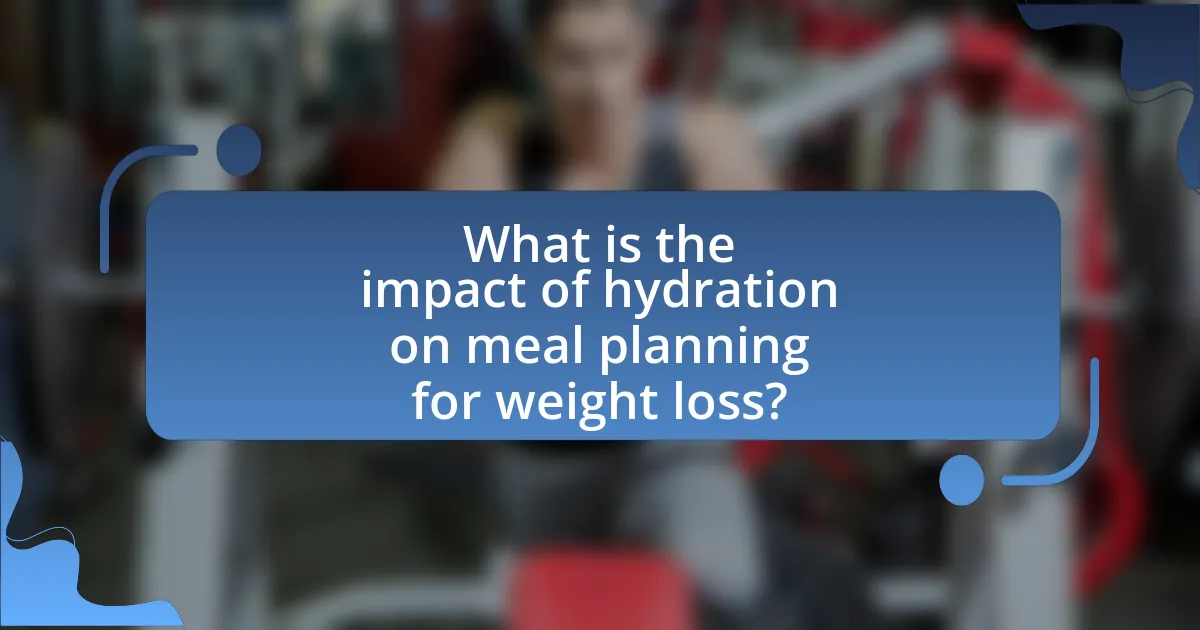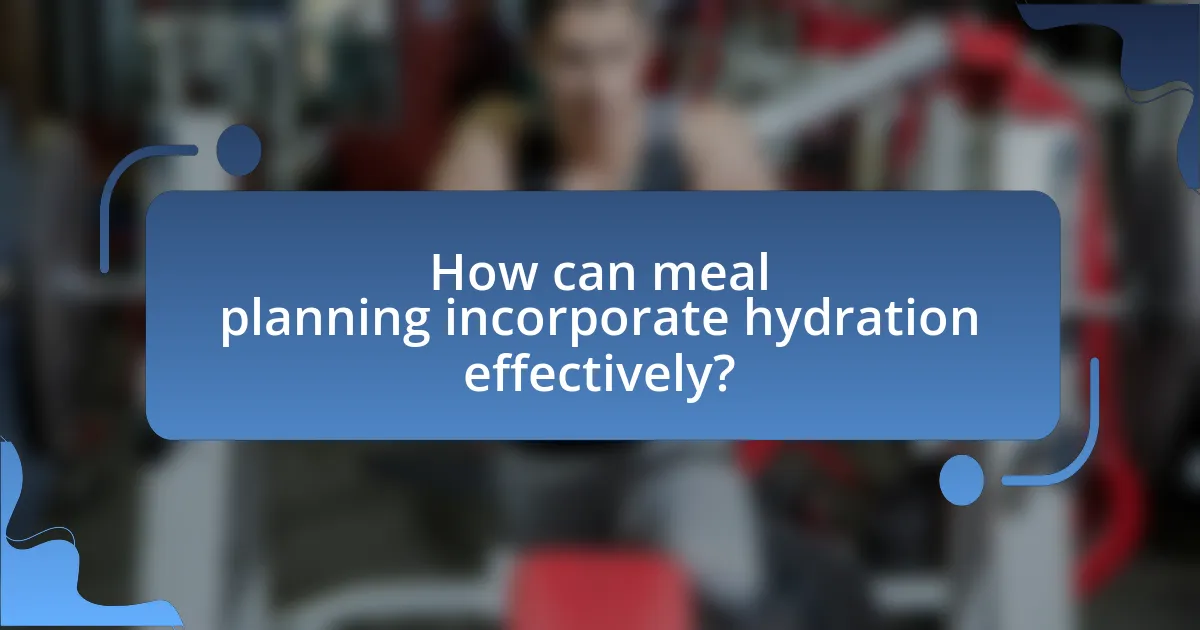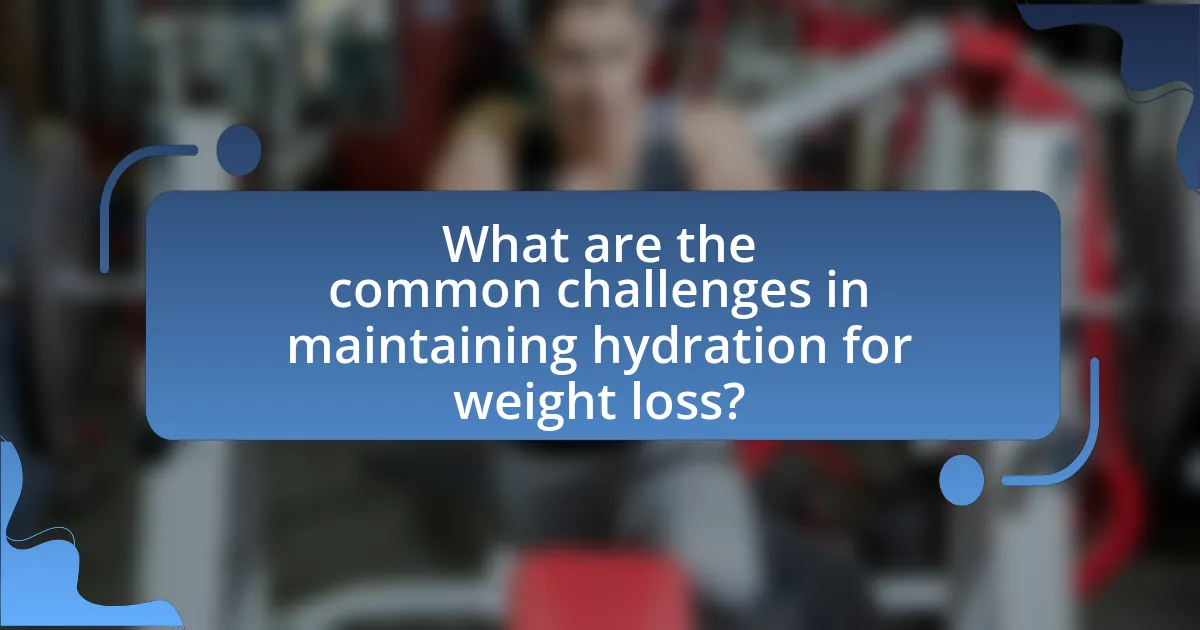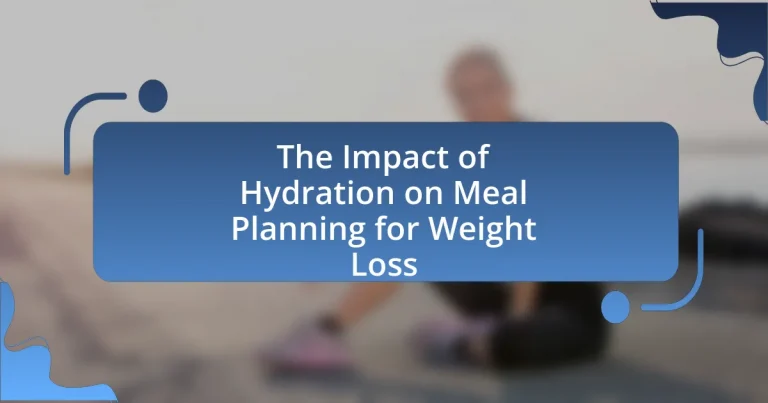Hydration plays a crucial role in meal planning for weight loss by influencing appetite regulation and metabolic processes. Adequate water intake can help control hunger, reduce calorie consumption, and enhance fat oxidation, making it essential for effective weight management. The article explores how hydration affects appetite, food choices, and cravings for unhealthy foods, as well as the physiological mechanisms linking hydration to appetite regulation. It also discusses practical strategies for incorporating hydration into meal planning, such as including water-rich foods and establishing a hydration schedule, while addressing common challenges individuals face in maintaining proper hydration for weight loss.

What is the impact of hydration on meal planning for weight loss?
Hydration significantly impacts meal planning for weight loss by influencing appetite regulation and metabolic processes. Adequate water intake can help control hunger, as dehydration often mimics feelings of hunger, leading to unnecessary calorie consumption. Studies indicate that drinking water before meals can reduce calorie intake by approximately 13%, aiding in weight loss efforts. Furthermore, proper hydration supports metabolic functions, enhancing fat oxidation and energy expenditure, which are crucial for effective weight management.
How does hydration influence appetite and food choices?
Hydration significantly influences appetite and food choices by affecting physiological signals related to hunger and satiety. When the body is dehydrated, it can misinterpret thirst as hunger, leading to increased food intake. Research indicates that adequate hydration can help regulate appetite hormones, such as ghrelin and leptin, which play crucial roles in signaling hunger and fullness. A study published in the journal “Obesity” found that participants who drank water before meals consumed fewer calories compared to those who did not, demonstrating that proper hydration can lead to healthier food choices and reduced caloric intake.
What physiological mechanisms link hydration to appetite regulation?
Hydration influences appetite regulation through several physiological mechanisms, primarily involving hormonal responses and neural pathways. When the body is dehydrated, it can trigger the release of hormones such as ghrelin, which stimulates hunger, while adequate hydration helps maintain the balance of leptin, a hormone that signals satiety. Additionally, the hypothalamus, which regulates thirst and hunger, can misinterpret signals of dehydration as hunger, leading to increased food intake. Studies have shown that even mild dehydration can lead to increased feelings of hunger and food consumption, highlighting the importance of proper hydration in appetite control.
How can proper hydration affect cravings for unhealthy foods?
Proper hydration can significantly reduce cravings for unhealthy foods by maintaining optimal physiological function and regulating hunger signals. When the body is dehydrated, it can misinterpret thirst as hunger, leading to increased cravings for high-calorie, unhealthy options. Research indicates that even mild dehydration can impair cognitive function and mood, which may further drive individuals to seek comfort in unhealthy food choices. A study published in the Journal of Human Nutrition and Dietetics found that adequate water intake can help control appetite and reduce the desire for sugary snacks, supporting the idea that staying hydrated is crucial for effective meal planning and weight loss.
Why is hydration important in the context of weight loss?
Hydration is crucial for weight loss because it helps regulate metabolism and suppresses appetite. Adequate water intake can enhance the body’s ability to burn calories, as studies indicate that drinking water can increase metabolic rate by approximately 30% for about 30-40 minutes. Additionally, staying hydrated can prevent the misinterpretation of thirst as hunger, which often leads to unnecessary calorie consumption. Research published in the journal Obesity found that participants who drank water before meals consumed fewer calories, leading to greater weight loss over time.
What role does water play in metabolic processes related to weight loss?
Water is essential for metabolic processes related to weight loss as it facilitates digestion, nutrient absorption, and the elimination of waste. Adequate hydration supports the body’s ability to metabolize fat and carbohydrates efficiently, enhancing energy expenditure. Research indicates that drinking water can temporarily boost metabolism by approximately 30% for about 30-40 minutes, which can aid in weight loss efforts. Additionally, water consumption before meals can reduce appetite, leading to lower calorie intake, further supporting weight loss goals.
How does hydration affect energy levels during weight loss efforts?
Hydration significantly affects energy levels during weight loss efforts by maintaining optimal physiological functions and preventing fatigue. Adequate water intake supports metabolic processes, including the breakdown of fat for energy. Research indicates that even mild dehydration can lead to decreased physical performance and increased perception of effort, which can hinder weight loss activities. A study published in the Journal of Nutrition found that participants who were well-hydrated experienced improved exercise performance and energy levels compared to those who were dehydrated. Therefore, staying properly hydrated is essential for sustaining energy and enhancing the effectiveness of weight loss efforts.

How can meal planning incorporate hydration effectively?
Meal planning can incorporate hydration effectively by including water-rich foods and scheduling regular fluid intake alongside meals. Research indicates that foods such as fruits and vegetables, which contain high water content, can contribute significantly to overall hydration; for example, cucumbers and watermelon are over 90% water. Additionally, planning specific times to drink water, such as before, during, and after meals, can enhance hydration levels and support weight loss efforts by promoting satiety and reducing overall calorie intake. Studies show that adequate hydration can improve metabolic rates and aid in the digestion process, further supporting weight loss goals.
What strategies can be used to ensure adequate hydration during meal planning?
To ensure adequate hydration during meal planning, incorporate water-rich foods and establish a hydration schedule. Water-rich foods such as fruits and vegetables, including cucumbers, watermelon, and oranges, can significantly contribute to overall fluid intake, providing essential hydration alongside nutrients. Additionally, setting specific times to drink water before, during, and after meals can help maintain consistent hydration levels. Research indicates that adequate hydration can enhance metabolic processes and support weight loss efforts, making these strategies effective for individuals aiming to lose weight.
How can meal prep help in maintaining hydration levels?
Meal prep can help maintain hydration levels by allowing individuals to incorporate hydrating foods and beverages into their planned meals. By preparing meals in advance, one can ensure that they include fruits and vegetables with high water content, such as cucumbers, watermelon, and oranges, which contribute to overall fluid intake. Research indicates that consuming foods with high water content can significantly enhance hydration status, as these foods can provide up to 20% of daily fluid needs. Additionally, meal prep facilitates the inclusion of water-rich soups and smoothies, further supporting hydration. This strategic planning not only promotes better hydration but also aids in weight loss by encouraging healthier food choices.
What types of foods contribute to hydration in a weight loss diet?
Foods that contribute to hydration in a weight loss diet include fruits and vegetables with high water content, such as cucumbers, watermelon, oranges, and strawberries. These foods not only provide hydration but also offer essential nutrients and fiber, which can aid in weight loss by promoting satiety. For instance, cucumbers contain about 95% water, making them one of the most hydrating foods available. Similarly, watermelon is approximately 92% water and is low in calories, making it an excellent choice for those looking to lose weight while staying hydrated.
How can tracking hydration improve meal planning outcomes?
Tracking hydration can significantly enhance meal planning outcomes by ensuring optimal nutrient absorption and metabolic function. Adequate hydration supports digestion, which is crucial for breaking down food and absorbing nutrients effectively. Research indicates that even mild dehydration can impair cognitive function and appetite regulation, leading to poor food choices and overeating. For instance, a study published in the Journal of Nutrition found that individuals who maintained proper hydration levels reported better satiety and made healthier food selections. Therefore, monitoring hydration levels can lead to more effective meal planning, ultimately supporting weight loss goals.
What tools or methods can be used to monitor hydration levels?
Tools and methods to monitor hydration levels include urine color charts, hydration tracking apps, and bioelectrical impedance analysis devices. Urine color charts provide a visual guide to hydration status, where lighter urine indicates better hydration. Hydration tracking apps allow users to log water intake and receive reminders, promoting consistent hydration habits. Bioelectrical impedance analysis devices measure body composition and hydration levels by sending a small electrical current through the body, providing accurate data on hydration status. These methods are widely used in health and fitness contexts to ensure optimal hydration, which is crucial for effective meal planning and weight loss.
How does awareness of hydration impact food choices and portion sizes?
Awareness of hydration significantly influences food choices and portion sizes by promoting healthier eating habits and reducing overall calorie intake. When individuals recognize the importance of staying hydrated, they are more likely to choose water-rich foods, such as fruits and vegetables, which are lower in calories and higher in nutrients. Research indicates that proper hydration can help regulate appetite; for instance, a study published in the journal Obesity found that participants who drank water before meals consumed fewer calories compared to those who did not. This awareness leads to smaller portion sizes, as individuals may feel fuller and more satisfied with less food when adequately hydrated.

What are the common challenges in maintaining hydration for weight loss?
Common challenges in maintaining hydration for weight loss include inadequate water intake, confusion between thirst and hunger, and reliance on calorie-laden beverages. Inadequate water intake often occurs due to busy lifestyles or lack of awareness about hydration needs, which can lead to decreased metabolic efficiency and hinder weight loss efforts. Confusion between thirst and hunger can result in unnecessary calorie consumption, as individuals may eat when they are actually dehydrated. Additionally, many people consume sugary or high-calorie drinks instead of water, which can contribute to weight gain rather than support weight loss. These factors collectively impede effective hydration, which is crucial for optimizing metabolic processes and supporting weight loss.
What obstacles do individuals face in achieving proper hydration?
Individuals face several obstacles in achieving proper hydration, including lack of awareness, accessibility issues, and lifestyle choices. Many people do not recognize the importance of adequate water intake, leading to insufficient hydration levels. Accessibility can also be a barrier, as individuals in certain environments may not have easy access to clean drinking water. Additionally, lifestyle choices, such as high consumption of caffeinated or alcoholic beverages, can contribute to dehydration. According to the National Academies of Sciences, Engineering, and Medicine, adequate daily water intake is essential for overall health, yet many adults do not meet these recommendations, highlighting the prevalence of these obstacles.
How can busy lifestyles affect hydration habits?
Busy lifestyles can significantly hinder hydration habits by reducing the time individuals allocate for drinking water throughout the day. Research indicates that people with hectic schedules often prioritize tasks over basic needs, leading to decreased water intake. A study published in the Journal of Human Nutrition and Dietetics found that individuals with busy work schedules consumed 1.5 liters less water daily compared to those with more flexible routines. This lack of hydration can negatively impact metabolism and appetite regulation, which are crucial for effective meal planning and weight loss.
What misconceptions about hydration might hinder weight loss efforts?
Misconceptions about hydration that might hinder weight loss efforts include the belief that drinking excessive amounts of water can directly lead to weight loss and the idea that hydration alone can replace a balanced diet. Drinking excessive water does not equate to fat loss; rather, it can lead to water retention and electrolyte imbalances, which may counteract weight loss goals. Additionally, relying solely on hydration without proper nutrition can result in nutrient deficiencies, ultimately impeding weight loss progress. Research indicates that adequate hydration supports metabolic processes, but it must be combined with a balanced diet for effective weight management.
What practical tips can enhance hydration in meal planning?
To enhance hydration in meal planning, incorporate water-rich foods such as fruits and vegetables, which can contribute significantly to overall fluid intake. For example, cucumbers, watermelon, and oranges contain over 90% water, making them excellent choices for hydration. Additionally, planning meals that include soups or broths can further increase fluid consumption, as these dishes are typically high in water content. Research indicates that consuming adequate fluids can aid in weight loss by promoting satiety and reducing overall calorie intake, as highlighted in a study published in the journal Obesity by Stookey et al. (2008), which found that increased water consumption is associated with lower body weight.
How can individuals create a hydration schedule that complements their meals?
Individuals can create a hydration schedule that complements their meals by timing their water intake strategically around meal times. For optimal digestion and nutrient absorption, it is recommended to drink water 30 minutes before meals and to limit fluid intake during meals to avoid diluting digestive enzymes. Additionally, consuming water 1-2 hours after meals can aid in digestion and hydration without interfering with the digestive process. Research indicates that proper hydration can enhance metabolic rates and support weight loss efforts, making it essential to align water consumption with meal timing effectively.
What are some easy ways to increase water intake throughout the day?
To increase water intake throughout the day, individuals can adopt several practical strategies. Carrying a reusable water bottle encourages regular sipping, as studies show that having water readily available increases consumption. Setting reminders on a smartphone or using apps designed for hydration can prompt individuals to drink water at regular intervals, which has been shown to effectively boost daily intake. Additionally, incorporating water-rich foods, such as fruits and vegetables, into meals can contribute to overall hydration, as these foods can contain up to 90% water. Drinking a glass of water before each meal can also help increase total water intake while aiding in portion control, which is beneficial for weight loss.


